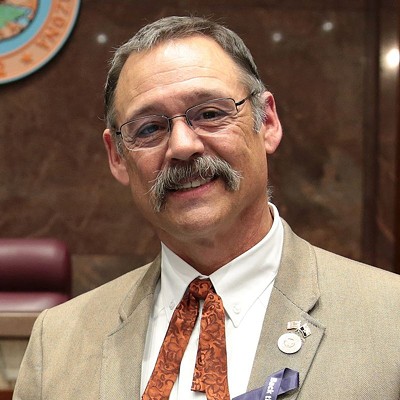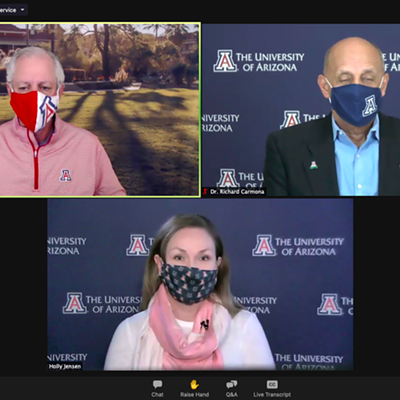Theo Bisbicos is sitting behind home plate with three of his buddies, drinking cold beer, talking baseball and razzing the visiting team.
Theo and his crew aren't really sure who the visiting team is—it's the Fresno Grizzlies, for the record—but that's not stopping them from enjoying this warm spring night.
What got Theo and about 3,500 other Tucsonans out to see the Tucson Padres on this Thursday night?
A simple answer: "Five bucks to get in, and dollar beers."
Theo and his fellow UA students had never before been out to Kino Stadium—the southside ballpark formally known as Tucson Electric Park—but they like what they see.
"We'll be back," Theo says.
Mike Feder sure hopes they will be. As the general manager of the Padres, it's Feder's job to get people out to the ballpark and prove that Triple-A baseball has a future in Tucson.
"It's exciting to be back," Feder says, although by the end of the first home stand last week, he confessed that he was feeling a bit tired as he tried to corral a group of Little Leaguers at the ballpark. The young team, decked out in Tucson Padres uniforms, was made up of kids from across Southern Arizona who were getting ready to travel to Mexico to represent the United States in an international tournament involving kids from throughout Latin America.
Feder wanted to recognize the Little League team at the game, because it's part of his plan to support the community—with the hope that the community is going to support the Padres.
Tucson's support for Triple-A baseball—the step right below the major leagues—has ebbed and flowed over the years, but it's never been stronger than when Feder ran the Tucson Toros at Hi Corbett Field back in the 1990s.
When Feder took over the struggling Toros ballclub back in '89, the team was drawing just more than 100,000 fans a year. On a mission to get Tucsonans to the games, Feder—along with his wife, Pattie, who works alongside him at the ballpark—introduced every promotion imaginable, from the well-known Thirsty Thursdays to a Diamond Dig which had women shoveling dirt behind home plate in search of a shiny rock. He lowered concession prices, improved the quality of the food and gave away tickets to get people through the gate. The team's slogan: "The Fun Is Back."
It worked. Annual attendance soared past 300,000.
It didn't hurt that in 1991, former UA basketball star Kenny Lofton came to play for the Toros and helped lead the team to a Pacific Coast League championship.
"When you get a UA basketball player, then all of a sudden you've got tremendous attention in this community," Feder says.
It was the start of a great run. The Toros won another championship in 1993 and continued to draw respectable crowds to the ballpark.
But the Toros franchise came to an end after the 1997 season. The following year, the new owner of the Triple-A club moved the team from Hi Corbett Field to the new Tucson Electric Park and changed the name to the Sidewinders to recognize the fact that the team was now the farm club for the then-new Arizona Diamondbacks.
Feder didn't last too long with the new ownership; he headed off to work for the New Orleans Saints and their arena-football subsidiary, the New Orleans VooDoo.
The hope that the Sidewinders could attract larger crowds willing to spend more money at the new ballpark turned out to be misplaced. Instead, attendance dwindled even as minor-league baseball became a hot ticket elsewhere.
After the 2008 season, the Sidewinders headed off to Reno, where they now play in a new downtown stadium. The Reno Aces drew more than 450,000 fans in their inaugural year.
The bad news for Tucson baseball fans didn't end there. In 2010, Major League Baseball spring training concluded here, ending a tradition that started back in 1947, when the Cleveland Indians began playing at Hi Corbett Field.
Feder, who had returned to Tucson after a stint managing the Austin Wranglers arena-football team, began working with the Pima County Sports and Tourism Authority to find a way to bring baseball back to Tucson.
The group was working on a plan to lure Japanese clubs to Tucson for spring training (an idea which Feder says remains a "distinct possibility") when the Portland Beavers Triple-A team found itself without a place to play after its stadium was transformed into a soccer facility.
Feder saw an opportunity and assembled a group of local investors who put up enough money to cover the costs to operate the Triple-A team, which is owned by an investment group headed up by onetime super-agent Jeff Moorad.
Moorad is trying to persuade the city of Escondido, Calif., to build a new ballpark for the club, but in the meantime, the club—named the Tucson Padres to reflect the fact that the team is the farm club for the San Diego Padres—will be here in Tucson for the next two years.
There's a chance the plan to build a stadium in Escondido could fall apart and the Padres could stay in Tucson. There's, also a chance that a good turnout by fans could bring another team to town.
"As far as we're concerned, it's not about two years," Feder says. "It's about making it work. And if we make it work, then we have all kinds of scenarios to get Triple-A baseball to return here permanently."
The Padres are a scrappy club. Several of their losses have come in one-run games, and there are a number of prospects who might be heading to The Show later this season.
One standout: Anthony Rizzo, a 21-year-old phenom who was drafted by the Boston Red Sox out of high school in 2007. Rizzo was sidelined in 2008 after he was diagnosed with non-Hodgkin's lymphoma. Now cancer-free, Rizzo was batting .432 after the game on Monday, April 25, and had hit seven homers in 18 games.
But Feder says minor-league baseball isn't about wins and losses.
"It's nice to win, and it gets people's attention, but it's not the reason people go to minor-league baseball games," Feder says. "They go for dollar-beer night. It's the San Diego Chicken coming back. That's what gets people out there."
With that in mind, Feder has lined up plenty of special events, from that rare appearance by the San Diego Chicken to fireworks on Saturday nights once a month. Every Sunday is Military Appreciation Night; fans will find Monday specials via Facebook; two-for-one tickets are available Tuesdays with Kraft cheese wrappers; hot dogs cost just a dollar on Wednesdays; and Thirsty Thursdays, co-sponsored by the Tucson Weekly, feature cups of Budweiser and sodas for just a buck. The goal: to offer family-friendly and affordable fun all summer long.
As part of this week's four-game home stand, which starts on Thursday, April 28, the Padres will play the Saturday, April 30, game at Hi Corbett Field as part of Roll Back the Clock Night, with disco music and a post-game concert by the Boogie Oogies.
The question remains: Will it all be enough to bring the fans out to Kino Stadium? On opening night, the official attendance topped 6,500, but crowds were a little thin during the rest of the first home stand as the Padres competed with the Pima County Fair, Tucson Weekly's Club Crawl® and a number of other spring events. It's a slow start, but Feder still hopes to draw 300,000 people to the ballpark this summer.
Feder says this could be Tucson's last chance at hosting a Triple-A baseball team.
"If we don't do well, that will probably be the end of Triple-A baseball," says Feder. "Obviously, I don't want to see that happen."
But he's optimistic about his chances. If he weren't, he wouldn't be working so hard to make it happen.
"Ten years ago, I never thought I would be running the club," Feder says. "It's kind of a dream come true, and now it's almost consumed me, because it's so important for us to keep Triple-A baseball in Tucson. I'm really confident that the community can step up."
C'mon, Tucson: What do you say we prove him right?















